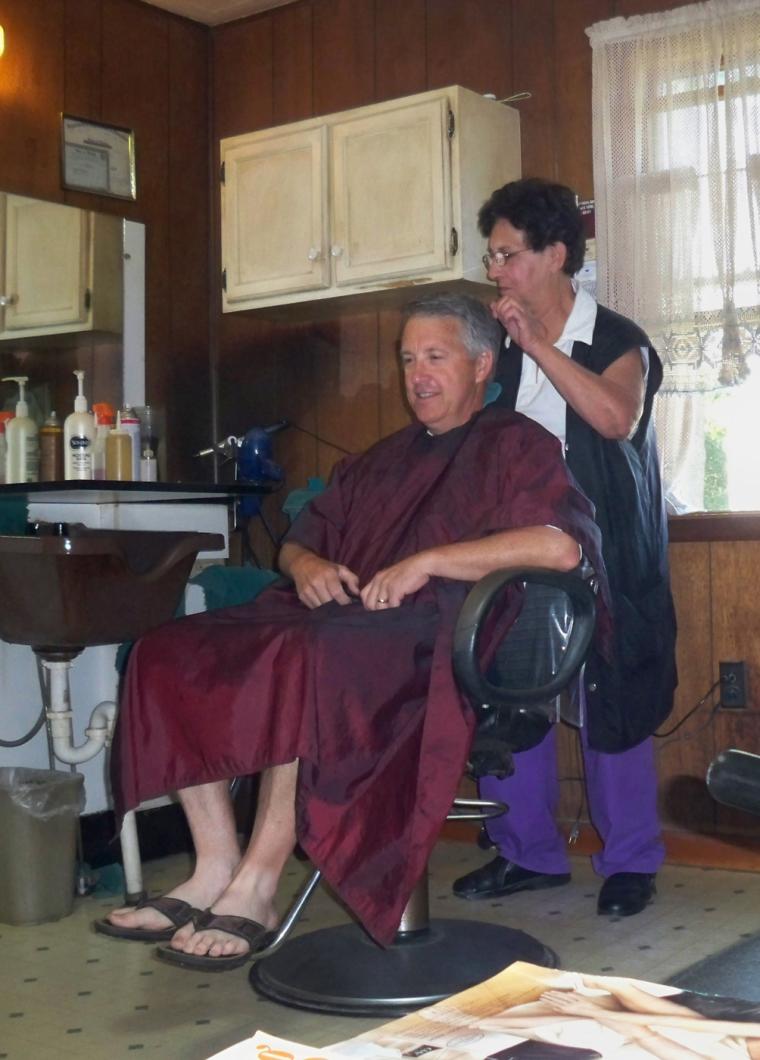Jeanie Mathis has never been to Martha’s Vineyard or any part of the East Coast. She lives in Reevesville, Illinois, population 50. Yet she knows about the Island because she reads every issue of the Gazette . . . twice. “I read it at the shop [a hair salon in her home] and then I reread it at night,” she said.
Everett Whorton Sr. (whose son, Everett Jr. fishes, scallops and builds houses on the Vineyard), lives 16 miles away from Reevesville in Paducah, Ky. He comes in regularly for his $2 haircut at Jean’s Beauty Shop, and hands over his latest edition of the Gazette. In earlier days, his son bagged copies of the broadsheet and brought them with him for his bi-annual visits. A couple of years back, Everett Jr. got the bright idea to buy his dad a subscription to the paper, so now the Paducah papa is able to hand Ms. Mathis her issue almost hot off the press.
Ms. Mathis began her long-distance attachment to the Island in high school when she checked out a library book about early American history. “I read about Bartholomew Gosnold touching down on Martha’s Vineyard in 1602.” The historical data preyed on her imagination, including the saga of the early Pilgrims who broke off from the original band, and in 1630 set up base camp in Great Harbour, now known as Edgartown.
“When a high school geography teacher asked us where we’d most like to live, I raised my hand and said Martha’s Vineyard.”
The story of Reevesville touches a chord of melancholy when we consider small American towns sacrificed by changes in industry or transportation. Johnson County grew with the advent of the railroads in the first part of the 20th century. A local line stopped in Reevesville to take on coal and water. The loading of cargo provided down time for passengers and crews. Three restaurants sprang up, along with two grocery stores and a small assortment of sundry goods and services shops. Two churches presided, but the pride of the town was a softball team called the Reevesville Regulars. It was the sort of community to which Professor Hill would have loved to sell 76 trombones.
Ms. Mathis, now 54, recalls a rich childhood of visits to Main street and helping her aunt at the Illinois Central Cafe. Her father worked on the railroad, as did most of the dads in the vicinity. And then in 1968 a decision was made in a corporate office far away from Reevesville, and the local train no longer chugged to a stop at the Reevesville depot.
Slowly the town died. One by one, restaurants and shops folded. One of the churches closed its high double doors. The single-room schoolhouse that Ms. Mathis attended through the eighth grade was dismantled, and now the handful of Reevesville children are bussed to school in the larger town of Vienna (pronounced Vee-ah-na), 11 miles down the highway.
“There’s nothing left here,” said Ms. Mathis, recently reached by telephone. “Just the one church and, across from that, my salon, the only business in town.”
For necessities such as bread and butter and luxuries such as movie theatres and libraries, Reevesville citizens drive to Vienna and also Metropolis, home of Superman, 13 miles away.
When she tries to explain her immersion in the Vineyard Gazette and, by association, the Vineyard itself, Ms. Mathis said: “It’s so beautiful, with the woods and fields and glimpses of water almost everywhere. And there’s so much going on with art and bird-watching and cultural events. Here no one talks about birds or writes about them. We hardly have any trees left, just chopped-up crop lands. I think it’s probably a good thing that your property prices are so high. Your land is precious and that way people can’t spoil it by over-building.”
I explained to her about the land bank working to preserve great swaths of wilderness.
She chuckled, “I’ve read all about the land bank! I admire that group very much.”
In the sixth grade, Ms. Mathis gave a friend her first home permanent from a Toni kit. “It turned out pretty good. After that I was always fooling around with hair until finally it became my work.”
Her husband is a retired house builder. She has a daughter who lives in Vienna and a four-year-old granddaughter. Their visits are plentiful. There are problems in Johnson County, however. “We’ve got chemical plants around here and a high rate of cancer,” she said.
Ms. Mathis maintains that reading about the Vineyard lifts her out of a life that she sometimes finds dismal into a realm of sea and sky and choices of activities such as kayaking in the marshlands, cruising past sheep farms with glimpses of a silver ocean, street festivals, cafes down on the docks, boats in the harbors, and walks on ancient pathways.
When asked what she especially enjoys in our paper, she says, “Well, I read every word which means I enjoy every word, but I especially like articles about birds and art.”
As I talk to Jeanie Mathis I find an old song of Judy Collins playing in my head — the one about losing her man to “the coming, the coming of the road.” In this case, the road, or more accurately, the train stop, was taken away, but the sensation of being immobilized in a partial ghost town is the same. As Ms. Mathis jokes, “We don’t even have enough people to gossip about!”
Clearly it’s time for Jeanie Mathis to put out a large glass bowl with a sign, “Tips for my trip to Martha’s Vineyard.” And maybe, just maybe, she’ll decide to stay.
She’ll need to charge more than $2 for haircuts, however.




Comments
Comment policy »